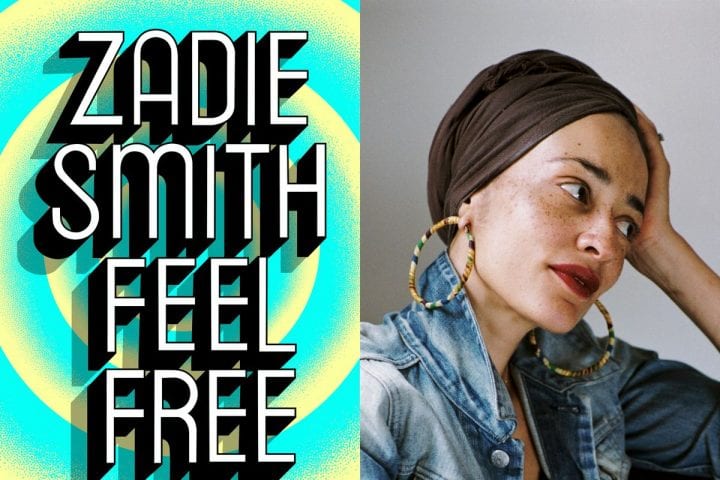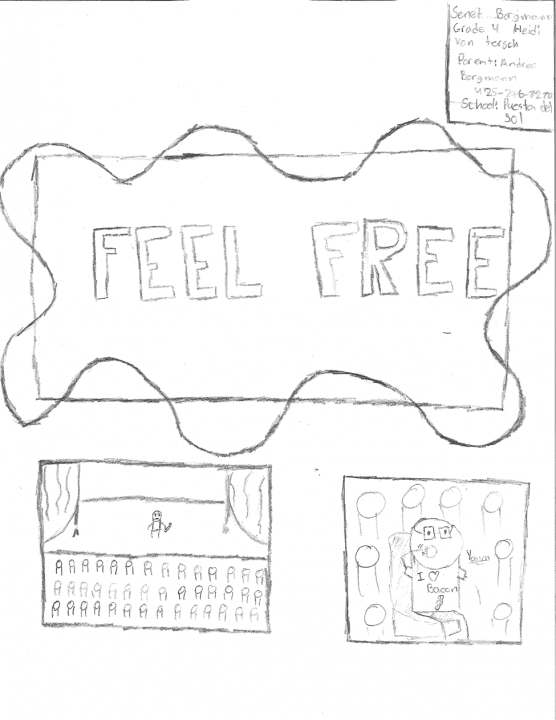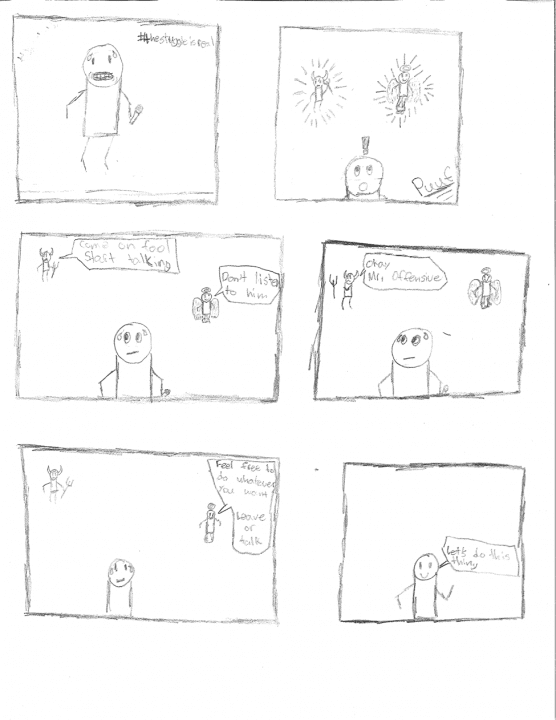
The 2018/2019 Elaine Wetterauer Writing Contest Winners & Chapbook
February 27, 2019
Every year, Seattle Arts & Lectures’ Writers in the Schools (WITS) program holds the Elaine Wetterauer Writing Contest to celebrate the wisdom, creativity, and heart captured in student and teacher poetry. This year, participating students and teachers were encouraged to reflect on art and culture that makes them “feel free,” inspired by the essay collection Feel Free by Zadie Smith, which examines art, history, culture, and their impacts on the world we live in.
The 2018/2019 Elaine Wetterauer Writing Contest winners and honorable mentions, including the categories of poetry, prose, and comics, will be announced tonight, February 27, at our Literary Arts Series’ Conversation with Zadie Smith. Pieces were selected based on their originality, use of language, and the success of the piece of writing as a whole.
Read the winners below, and read other outstanding submissions in the Elaine Wetterauer Chapbook, here.
Student Winner in Prose
Helena Goos
Nathan Hale High School, 10th Grade
WITS Writer: Matt Gano
Inexhaustible Abundance
Sarah walked across the barren earthscape, oxygen mask covering her face, goggles fogging as she exhaled. It was spring, (according to the calendar in the bunker) but the sky was still choked with the dust and smog of everything. Watery sun filtered through the particulates, illuminating the landscape in a cream-colored light. Even though it had been almost 90 years since the last bomb had fallen, the earth still hadn’t recovered. This fact was evident in the perpetual skeleton-like state of the trees and shrubs around the area. The surface of the earth was predicted to never flush itself clean, at least not to the point of hospitality for humans. Sarah, however refused to accept this fate and had dedicated herself to hypothetical plants. A botanist it was called. She herself had never seen a plant before, and she had been told that she never would. They never needed plants in the bunker. All her vitamins that would come from plants were stuffed into a convenient little pill that she took daily before breakfast. Al, Sarah’s wife, had always found laughable irony in the fact that Sarah was a plant scientist in a plantless world.
“You don’t study what is,” joked Al. “You study the theory of what is.” Sarah always laughed along, and though there was an irony of a plant scientist in a plantless world, Sarah had always felt sad at the thought that she would never see the organic color green with her own eyes. She was so desperate to find something, anything, to prove that one day humans could re-habit the earth again, that she frequently brought dead samples home to study them, half-convinced they were alive. Often Al would come in at 12 A.M. saying, “I’m sorry… but honey… it’s getting late. Come on to bed.” Sarah would reluctantly put down her magnifying glass and tweezers, turn off her microscope and do so. So many times, Sarah had collected what she liked to call ‘False Alarms’ that she was surprised she even bothered to come outside anymore.
Depressed by this train of thought, Sarah took a rest on a pile of rubble. She had often stopped to ask herself why she did come outside. Why try to find something in a world that was so obviously dead? It was a waste of time. And yet, and yet, there was something, some small sliver of hope that drove her out of bed each morning to watch the sun rise, and to search to find any life. Sarah had been born after the Hydro-wars had destroyed the planet’s surface, in a bunker marked #KC84. There she had been raised, gotten married, and lived. The bunker had been her whole life, and would continue to be in the future. The one distraction from the monotony of grey below the earth was her morning walks/searches for life on the surface.
As she swept her gaze over the desolate earthscape, something caught her eye. Sarah did a double-take and whipped her head back around, trying to pinpoint the color. There, there it was! Among a group of dead plants, an entire bush, sickly and brown, sported yellowish leaves. Sarah stumbled to the plant, her heart accelerating as she did. Could it really be?
She knelt beside the thing in silent awe. The silence surrounded her like a blanket, covering her senses, and all she could her was her own breathing.
“It was the strangest thing,” she would later say. “I’d never seen anything quite like it.” It was beautiful, and ethereal and eerie all at the same time. As Sarah watched it, the small bud gently supported by her hand, she realized something was wrong. You didn’t have to be a botanist to tell something was wrong with the plant. The leaves were yellow and sickly, with brown spots speckling them. It was pale and yellow, though the wood of it looked a healthy brown color. The small bud had petals peeking out, looking grey and poisoned. The flower looked familiar somehow. Sarah racked her brains for identification for the plant and pulled up a memory of a page in her history textbook with a large image of the shrub. The plant was a… 무궁화. Or a Korean Rose. It was a hearty plant that produced pale pink buds, with a long pollen stem in the middle. It was the national symbol of Korea, and that day, Sarah’s class had glossed over the section.
Sarah observed the embryos before her. So fragile, so tiny, yet strong and courageous at the same time. She remembered that during the Japanese occupation of Korea, there had been an official order of destruction of all these plants, and that people sometimes hid them in their gardens and houses; rebelling in one of the few ways they could.
Sarah remembered her grandmother telling her stories of life before the H-wars, and of the 무궁화 plants she kept in her backyard. “They didn’t just represent my home.” she’d said, “They come back each spring, and they bring their blooms with them. It is a cycle of death and rebirth. They represent eternity, hope that life will come again; inexhaustible abundance.” As she watched the 무궁화 , Sarah felt a smile spread across her face as she recalled her 할머니’s words. It seemed fitting somehow, that the very plant that was a representation of abundance should be the first to emerge from this toxic world. She felt tears spring to her eyes at the realization of what the plant before her meant. Life wasn’t just theoretically possible, life is possible.
Sarah had never felt so freed by the possibility of something before. If life was possible for plants, then life would be possible for humans. Al would never believe it. She turned from the plant still grinning, eyes filled with tears. Behind her, as she hurried back to the bunker, the 무궁화 blossoms spread their frail, thin, petals to meet the pale light.
Student Winner in Comics
Senet Borgmann
Puesta Del Sol Elementary School, 4th Grade
WITS Writer: Evelyn Garcia
Feel Free


Student Winner in Poetry
Audrey Anusaga Lonise Lefono
Seattle Children’s, 5th Grade
WITS Writer: Sierra Nelson
Freedom Feeling
Soaring through the sky
feeling free like you can do anything!
You can travel places.
You can do this.
You can make things happen.
When I hear the word “free”
I picture you soaring through the air,
free, nothing holding you down.
Faith and hope help me feel free.
And love. And blessings.
Everyone who loves you for who you are.
My family. Jesus.
This is my list of things that help me to feel free,
to know that I can do this.
If someone was feeling not free,
I would tell them to not lose hope
and not lose faith. If they fall down,
to get up again and just keep trying.
Because one day they’ll meet that goal.
The color of my free is gold,
real and super shiny gold.
The sound of my free is birds chirping,
singing a perfect little melody on a tree branch.
The taste of my free is sweet and juicy,
the sweetness of a piece of candy,
the juiciness of a fruit.
The smell of my free is the caramel
you smell in the air at the coffee bar.
The texture of my free would be soft
and cuddly, like a blanket, or teddy, or a cloud.
The movement of my free would softly drift like a cloud.
I imagine myself in a car heading home,
with the clouds and everything drifting away,
but in a soft way, if you just think of it in a calm way,
feeling free.
Teacher Contest Winner
Sarah Pattison
McClure Middle School, 7th & 8th Grade
WITS Writer: Christina Lee Barnes
Red Dust
What is in my blood?
The poetry of clay.
Red dust in my lungs,
coats my insides.
Sifted and strained
through the fingers of my family.
Gnarled and blistered,
sun-spotted,
worn skin.
I grew up in a desert fortress.
Its bones welded together from scraps
formed from native granite and concrete.
The walls were built
one by one.
This, in my mind’s eye,
stands in harsh contrast
to the velvet quilting of the Jodhpur.
Tiered and embossed,
soft yet effective.
An open-air palace,
this wealth makes a show of having no walls.
Cyclical notes stir my insides
in a spiral.
Seated close to the ground, my hips ache.
Time and custom move in continuity.
The rusty color of fortune reigns here too.
Lucky in heritage,
there are invisible boundaries.
We wear this hue
like dust on skin.
Luck is in the ground and you plant it there yourself.
My incubator was hard against the elements.
It protected me, then
set me free.
I count my blessings like
fine beads on embroidery.
Offered every instrument
as my brother.
Taught to use them well
by my father-
hammer,
wire-cutter,
welding irons.
Re-fashioned tools,
made to be used again.
Student Honorable Mention
Lars Kowalczyk
Alki Elementary School, 5th Grade
WITS Writer: Jeanine Walker
The Rain
The rain falls in
a cave making
an echo that can
be heard for miles.
The rain falls over
the world to put it to sleep
The rain falls on my
roof to put me to sleep
with great dreams like
a caterpillar in his cocoon
dreaming his big dreams of
wings
Teacher Honorable Mention
Doug Sylver
Nathan Hale High School, 9th Grade
WITS Writer: Matt Gano
Sappho’s Song
That night
in a strange bed
Sappho
kissed me
on the forehead
whisper-singing
in my ear.
“You are meant
to enjoy this beauty
in all its many forms,
the endless fields
of grapes
of olives,
the endless waves
of sea
of sky,
the endless beauty
of your love
her eyes
her smile
her heart.”
That day
Sappho’s song
as promised
came true
the sun-drenched beach
black olives, dates and figs
white wine
laughing in a
new language
floating to the edge
just as the cerulean sea
gets kissed on the forehead by
the cerulean sky
enjoying all this beauty
Sappho
my love and I.